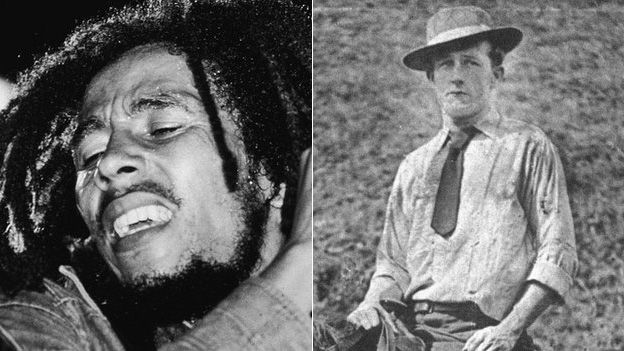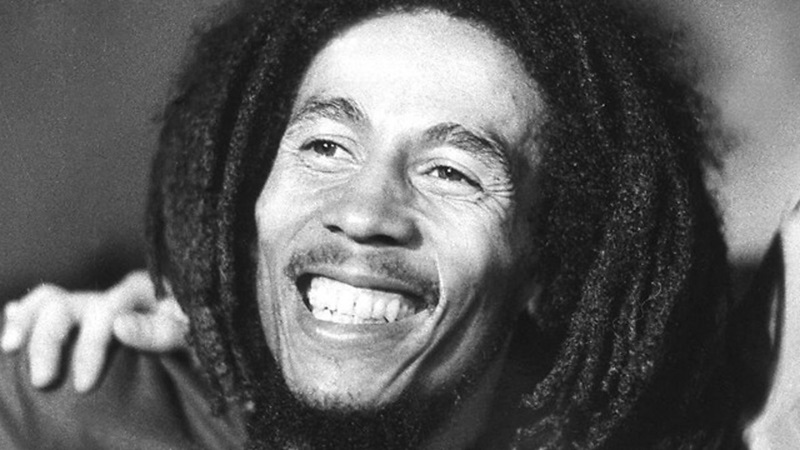World War One was a defining moment in history that not only reshaped the world map but also left a profound impact on countless lives, including that of Norval Sinclair Marley, better known as the father of reggae legend Bob Marley. Born in 1895, Norval was a white Jamaican overseer of a plantation who served as a captain in the British Army during the Great War. His life was marked by the complexities of race, class, and colonial tensions, which in turn, undeniably influenced his son, Bob Marley’s, world view and musical legacy.
Norval Sinclair Marley was a man of many contrasts. Coming from a family of Syrian Jewish descent, he was a member of the British colonial establishment in Jamaica, a society defined by racial segregation and social hierarchy. His marriage to Cedella Booker, a black Jamaican woman, was unconventional, causing a stir in the racially divided society of the time. This interracial union resulted in the birth of Robert Nesta Marley, who would grow up to become a beacon of hope, unity, and resistance, using his music as a tool to challenge societal norms and voice the struggles of the oppressed.
Norval’s participation in World War One was a significant chapter in his life, one that undoubtedly shaped his perspective. As part of the British Army, he witnessed the horrors of war, the destruction, and the aftermath. Despite the turmoil, he managed to survive, carrying the physical and psychological scars with him. However, his experiences in the war remain largely unexplored, leaving a gap in our understanding of this complex figure.
It is crucial to note that Norval’s influence on Bob Marley’s life was limited. He left the family when Bob was only ten years old, leaving his son with a sense of abandonment that would later resonate in his music. Despite the lack of a consistent paternal presence, Bob Marley’s understanding of his mixed-race heritage, his father’s military service, and the societal tensions he experienced during his childhood, all contributed to shaping the artist’s perspective on race, class, and the struggle for justice.
Bob Marley’s music is a testament to his father’s complex legacy. His songs often tackle themes of racial unity, social justice, and resistance against oppression, all themes that can be traced back to his formative experiences. His father’s war experiences, his involvement in a racially divided society, and the abandonment Bob felt, all played a part in shaping the artist’s world view.
In conclusion, the complex legacy of Norval Sinclair Marley, Bob Marley’s father, is an intricate tapestry woven with threads of racial tension, class struggle, and the scars of World War One. Although his influence on his son was indirect, it is undeniable that his life experiences helped shape the consciousness of one of the most influential musicians of the 20th century.

A Troubling Profile: The Neurotic Traits of Bob Marley’s Father
Norval Sinclair Marley, the father of reggae icon Bob Marley, exhibited a spectrum of neurotic traits that greatly influenced his complex persona. Born into a family of British descent, he had a reputation for unpredictability, frequently displaying mood swings and emotional instability. His erratic behavior was often attributed to his constant struggle with internal conflict, manifesting in a series of unsteady relationships and inconsistent commitments throughout his life.
Norval’s neurotic disposition was most evident in his relationship with his son, Bob Mar good law wrong illegal Marley, and Bob’s mother, Cedella Booker. Despite fathering Bob, he was largely absent from his life, a trait symptomatic of a neurotic personality disorder. Norval’s avoidance of emotional intimacy and lack of parental responsibility left a profound impact on Bob, influencing his music and personal philosophies.
Moreover, Norval’s neuroses extended to his social interactions. He was known for his aloofness and lack of emotional connection with others, often maintaining a facade of indifference to mask his internal struggles. This emotional detachment not only isolated him from his peers but it also amplified his internal conflicts, further exacerbating his neurotic tendencies.
However, it’s important to note that Norval’s neurotic traits were not entirely detrimental. His eccentricities and unpredictable nature also contributed to his unique charm and charisma. He was a captivating storyteller with a knack for capturing the attention of those around him, and his unconventional lifestyle fascinated many. Despite his flaws and neuroses, Norval Sinclair Marley remains a complex figure, remembered not only as Bob Marley’s father but also as an individual defined by his own intricate personality traits.
In conclusion, Norval’s neurotic traits, characterized by emotional instability, detachment, and inconsistency, deeply affected his relationships and personal life. Yet, they also shaped his unique character, making him a truly intriguing figure. His story serves as a reminder of the complexities of human nature, the influence of parental behavior on children, and the profound impact of personal struggles on an individual’s life.
The Romanticized Narrative: Debunking Myths and Rumors
The Romanticized Narrative: Debunking Myths and Rumors is a topic that delves into the intricate web of false perceptions that society often embraces due to either ignorance or a desire to escape reality. The romanticized narrative refers to the distortion of facts and information, painting an overly idealistic and often misleading picture of events, situations or individuals. This is usually presented in a way that appeals to our emotions and fantasies, making it easy for us to accept without question.
The danger lies in the fact that these narratives, whether they pertain to history, popular culture, or personal relationships, can shape our worldview and influence our actions. When we fail to debunk these myths and rumors, we risk making decisions based on falsehoods, which can have far-reaching consequences. For instance, the media often portrays celebrities in a flawless light, creating an unrealistic standard of beauty and success that can negatively impact self-esteem and mental health. Similarly, historical events are sometimes romanticized to promote nationalism, often at the expense of truth and justice.
Debunking these myths and rumors is crucial in promoting critical thinking and fostering a society that values truth over fantasy. This involves questioning the sources of our information, seeking out diverse perspectives, and acknowledging that reality is often more complex than the simplified narratives we are presented with. By doing so, we can begin to see the world more accurately, free from the distortions of romanticized narratives.

Life in a POW Camp: A Harsh Reality
Life in a Prisoner of War (POW) camp presents a brutal and harsh reality that is unimaginably distressing. The deplorable conditions in these camps often defy the very essence of human dignity and respect. Often overcrowded, these camps lack basic amenities, with inmates subjected to unsanitary conditions and inadequate food and clean water. The physical challenges are further exacerbated by the psychological torment, a relentless onslaught of despair and fear of the unknown.
Despite rules set by international conventions to protect prisoners during wartime, many POWs are subjected to cruel and inhumane treatment. This grim treatment includes forced labor, physical abuse, and sometimes, even death. In some instances, prisoners are used as pawns in political negotiations, their lives dangling precariously in the balance of power.
The inmates’ daily struggle transcends mere physical survival; it extends to the preservation of their mental and emotional well-being. Many POWs cling to fleeting memories of their previous life and loved ones, which serve as the only source of resilience in the face of relentless adversity.
Yet, even in this bleak environment, stories of courage, camaraderie, and survival emerge, reflecting the indomitable human spirit. Instances of prisoners helping each other, sharing scarce resources, and preserving their sanity by keeping hope alive are testimonials of their incredible resilience.
In conclusion, the life of a POW is a stark reminder of the grim realities and the inhumanity of war. It underscores the urgent need for more stringent enforcement of international conventions to ensure the humane treatment of war prisoners. The world must not turn a blind eye to these harsh realities, but instead work tirelessly to prevent such atrocities and safeguard human dignity in all circumstances.
Bob Marley’s Father’s Military Service
Norval Sinclair Marley, the father of the legendary reggae musician Bob Marley, led a life of service in the British military. Born in 1895, he served as a British naval captain during the First World War. It was during his time in the military that he became acquainted with Cedella Booker, a Jamaican local who gave birth to his son, Bob Marley, in 1945.
Norval’s military career was characterized by a strong sense of duty and discipline, traits that significantly influenced his early relationship with his son. Despite his commitment to his military service, Norval often found himself distanced from his family due to his military obligations, leading to a strained relationship with his son. However, his military background contributed to Bob’s upbringing, shaping his worldview and inspiring his music.
Bob Marley’s lyrical themes often reflected a sense of social justice and a call for unity, which can be linked back to his father’s commitment to service and duty in the military. Although Norval’s military career kept him away from his family, it played a crucial role in shaping the iconic artist his son, Bob, became. His influence is evident in the powerful messages of peace, unity, and resilience that Bob Marley’s music continues to inspire across the world.

The Legacy of Bob Marley’s Father
Norval Sinclair Marley, Bob Marley’s father, was a British marine officer of Syrian Jewish descent. Although he was absent for most of Bob’s life, he played a critical role in shaping the future reggae icon’s identity and worldview. Norval Marley was not a conventional father figure. He was a white man in a predominantly black society, and his relationship with Bob’s mother, Cedella Booker, a black Jamaican woman, was considered controversial due to the racial prejudices of the time.
Norval’s unique background and the experiences Bob had in his youth, dealing with the social implications of his mixed-race heritage, influenced the themes of unity, love, and understanding that pervade Bob’s music. This influence, albeit indirect, helped Bob Marley to become an international symbol of resistance and peace. Norval’s legacy, therefore, extends beyond his personal life and into the powerful messages of his son’s music.
It is also worth noting that Norval’s profession as a marine officer influenced Bob’s upbringing in various ways. Bob grew up in a world marked by the clash of different cultures, races, and social classes, which informed his music’s universal appeal. Despite the complexities of their relationship, Norval’s multicultural background and his experiences with social injustice indirectly shaped Bob Marley’s music, contributing to its enduring influence and relevance.
In a broader sense, the legacy of Norval Sinclair Marley is a testament to the power of music as a tool for social change. Through his son, his life story continues to resonate with audiences worldwide, reminding us of the importance of understanding, acceptance, and unity in a world often divided by prejudice and discrimination.
